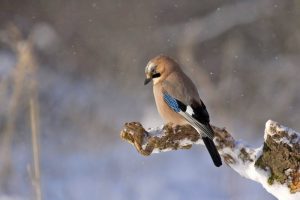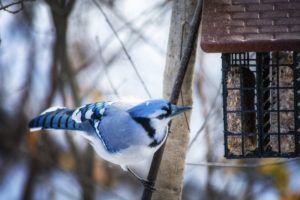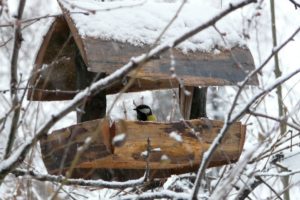
Fall is in full view, and winter is just ahead. With that, it’s time to approach an important part of our backyard bird-watching experience with the readying of advice. Summer celebrates the full array of birds that prefer various locations, but fall and winter are important as they present new, sometimes challenging aspects to the health and acceptance of our birds in the wild.
There are many varieties of backyard birders. Some go to great detail-driven lengths to attract birds. With specialty housing, cameras, specialty foods, and a collection of watering solutions, they maintain a backyard paradise for birds. Others are more casual in their birding experiences and simply ensure the timely and continuous placement of food. Birders of all kinds derive visual enjoyment from watching birds partake in the efforts. A mental state is often achieved with birding that feed a needed happiness and contentment within us. But to fully enjoy the effort, care must be undertaken in our efforts.
Keep It Clean
It’s important to be sure that all feeders are cleaned on a consistent basis. This is so that diseases carried by birds are not passed on to other birds needlessly. Typically, fall washing of feeders can be achieved with hot soapy water. Extra precaution can be provided by using a small amount of bleach in your washing solution, followed by thorough rinsing. Not only should this be done per season, but it should be done more frequently, perhaps even monthly (or more).
Extra Food for Winter

Proper food that includes seeds and suet should be amply provided especially when a winter storm is forecasted. Cold weather requires expendable energy by birds, and available food helps with that replenishment of energy to keep warm. Suet provides a great source of energy for birds. And remember that suet feeders need strong cleaning as well as traditional feeders. During the winter months, there is no such thing as too much food.
Water Needs
Water is quite important for birds. With winter temps dropping and freezing many sources of available water, it can be a lifesaver that flowing water is available to them. Some backyard birders provide water sources. But in the winter months in colder areas, the water can be kept liquid using de-icing birdbaths. They keep the temperature just right to avoid water freezing during freezing snaps and adjust accordingly as the temperatures rise. As with feeders, birdbaths should be maintained as clean as possible to avoid the transfer of diseases that can hurt birds.
Winter Housing Needs

Housing turns from nests to roosts as birds utilize them to help keep warmer during seasonal cold blasts. As with feeders, the roosts should be clean and inviting for birds that are apt to embrace their use. Such shelter is often used as a temporary respite from the cold and should be represented as a place for necessary shelter. Active birders can have several of these makeshift roosts strategically placed around the yard.
Birding is rewarded by a beautiful vision of peace as the birds take full advantage of the things you have provided them. You get enviable photo opportunities, a double, sometimes triple dose of happiness, and the comfort of knowing that you have taken the time to make life easier for our flying friends of nature.
Winter is tough for everyone and everything. Simple preparations for our birds will yield the best of Winter for you and them.
